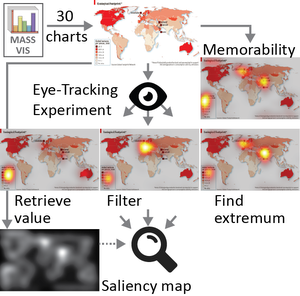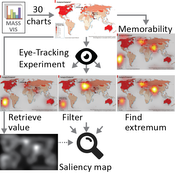Information
- Publication Type: Journal Paper (without talk)
- Workgroup(s)/Project(s):
- Date: February 2018
- DOI: https://doi.org/10.1016/j.cag.2018.01.010
- Journal: Computers & Graphics
- Number: 2
- Open Access: no
- Keywords: Information visualization, Eye-tracking experiment, Saliency, Visual attention, Low-level analytical tasks
Abstract
Memory, visual attention and perception play a critical role in the design of visualizations. The way users observe a visualization is affected by salient stimuli in a scene as well as by domain knowledge, interest, and the task. While recent saliency models manage to predict the users’ visual attention in visualizations during exploratory analysis, there is little evidence how much influence bottom-up saliency has on task-based visual analysis. Therefore, we performed an eye-tracking study with 47 users to determine the users’ path of attention when solving three low-level analytical tasks using 30 different charts from the MASSVIS database [1]. We also compared our task-based eye tracking data to the data from the original memorability experiment by Borkin et al. [2]. We found that solving a task leads to more consistent viewing patterns compared to exploratory visual analysis. However, bottom-up saliency of a visualization has negligible influence on users’ fixations and task efficiency when performing a low-level analytical task. Also, the efficiency of visual search for an extreme target data point is barely influenced by the target’s bottom-up saliency. Therefore, we conclude that bottom-up saliency models tailored towards information visualization are not suitable for predicting visual attention when performing task-based visual analysis. We discuss potential reasons and suggest extensions to visual attention models to better account for task-based visual analysis.Additional Files and Images
Weblinks
- https://www.sciencedirect.com/science/article/pii/S0097849318300104
- DOI: https://doi.org/10.1016/j.cag.2018.01.010
BibTeX
@article{polatsek-2018-stv,
title = "Exploring visual attention and saliency modeling for
task-based visual analysis",
author = "Patrik Polatsek and Manuela Waldner and Ivan Viola and Peter
Kapec and Wanda Benesova",
year = "2018",
abstract = "Memory, visual attention and perception play a critical role
in the design of visualizations. The way users observe a
visualization is affected by salient stimuli in a scene as
well as by domain knowledge, interest, and the task. While
recent saliency models manage to predict the users’ visual
attention in visualizations during exploratory analysis,
there is little evidence how much influence bottom-up
saliency has on task-based visual analysis. Therefore, we
performed an eye-tracking study with 47 users to determine
the users’ path of attention when solving three low-level
analytical tasks using 30 different charts from the MASSVIS
database [1]. We also compared our task-based eye tracking
data to the data from the original memorability experiment
by Borkin et al. [2]. We found that solving a task leads to
more consistent viewing patterns compared to exploratory
visual analysis. However, bottom-up saliency of a
visualization has negligible influence on users’ fixations
and task efficiency when performing a low-level analytical
task. Also, the efficiency of visual search for an extreme
target data point is barely influenced by the target’s
bottom-up saliency. Therefore, we conclude that bottom-up
saliency models tailored towards information visualization
are not suitable for predicting visual attention when
performing task-based visual analysis. We discuss potential
reasons and suggest extensions to visual attention models to
better account for task-based visual analysis.",
month = feb,
doi = "https://doi.org/10.1016/j.cag.2018.01.010",
journal = "Computers & Graphics",
number = "2",
keywords = "Information visualization, Eye-tracking experiment,
Saliency, Visual attention, Low-level analytical tasks",
URL = "https://www.cg.tuwien.ac.at/research/publications/2018/polatsek-2018-stv/",
}


 paper
paper
